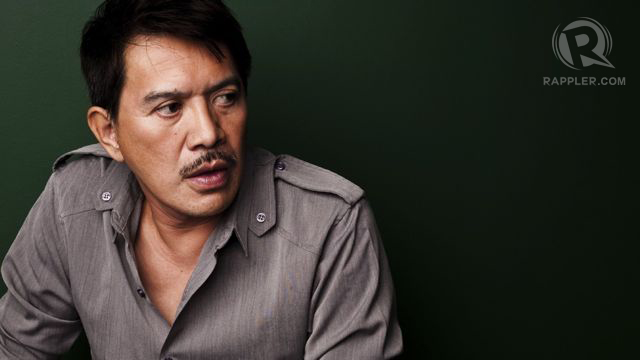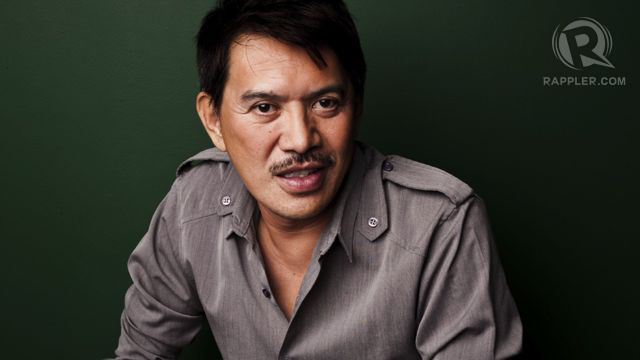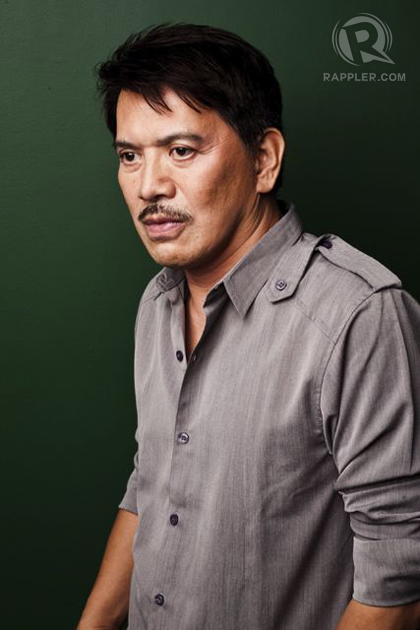SUMMARY
This is AI generated summarization, which may have errors. For context, always refer to the full article.


MANILA, Philippines – Critically-acclaimed director Brillante Mendoza is best known for tackling gritty, controversial issues in his films.
He debuted into filmmaking in 2005 with Masahista, a film about spakols (massage with a “happy ending”) starring Coco Martin. He moved on to make movies about a day in the life of a family that runs an adult theater (Serbis) and a police academy student who finds himself in a gang that brutally butchers a woman (Kinatay), to name a few.
While a quick Google search will lead you to a formidable profile of films and distinctions, in person, Dante (as he is known to friends and family) makes no mention about his awards unless he is asked.
“At first you get high about being recognized because it’s a validation of your hard work,” he says. “But as you mature and make more films, it becomes something else. It becomes about your purpose and your goal for being a filmmaker.”
He continues, “Why do you want to make films? Why do you want to tell these kinds of stories? It’s no longer about you, but about your advocacy.”
His current projects are Captive, a film about the Dos Palmas kidnapping in Palawan, which he started shooting back in 2001. Starring French actress Isabelle Huppert, the film captivated German audiences at the Berlin International Film Festival last February and is expected to hit Philippine screens this December.
He also recently finished shooting Thy Womb in Tawi-Tawi, Mindanao, a film about the Badjaos, centered around a midwife coping with the irony of her own infertility. The film stars Nora Aunor, Bembol Roco, Lovi Poe and Mercedes Cabral. It will also be shown in the latter part of the year.
While Dante makes independent films that are relegated to the fringes of mainstream cinema, he makes sure his topics are always relevant to the current state of the country, even if these topics happen to be the kind of truths no one really likes to discuss.
“For instance, with Captive, we still have kidnappings up until now. From time to time you’ll read about it in the news,” Dante says quietly. “11 years after the Dos Palmas incident, it is still happening right now in the Philippines. And a lot of these cases haven’t been solved.”
Dante’s objective for coming up with such films is to speak to the Filipino audience — particularly the youth and the studentry — because he believes they are more open to explore, to read and be experimental in a lot of ways.
“I think the young audience now has the power to change whatever the older generation wasn’t able to do,” he says.
Through his films that tackle social issues and even those that border on the darker side of society, Dante hopes to encourage the Filipino audience to face reality and deal with what’s really happening around them and in everything that they do. “We should acknowledge that there are problems going on. Because for as long as we don’t, they will never be solved.”

Presenting various realities, whether highly publicized or massively denied, will always be an integral part of who Dante is as a filmmaker.
“At the end of the day it’s not about being controversial, but simply being truthful about the issues that surround us.” – Rappler.com
(Editor’s note: Brillante Mendoza’s humility is worth mention.
When I was putting the shoots and interviews together, cinematic makeup expert Georginna Desuasido recommended a certain “Dante,” whom she referred to as a “Cannes Palme d’Or” recipient. She gave me his number the following day, and unknowing me started communicating with “Dante.”
“Dante” would reply quickly; and as SMS messages go, “sounded” kind. He honestly said he would be late for our 5pm calltime, and asked if he may be accommodated at a later time. I replied to him with a chirpy, “Sure! :)”
Imagine my face when, on the day of our shoots and interviews in the office, “Dante” emerged from the shadow outside our Rappler office door and I found myself face to face with THE Brillante Mendoza.
I was shocked beyond words. Great thing he was with someone I already knew, HF Yambao.
Direk Dante (now I know that’s his nickname!) quietly stayed in a corner, waiting for his turn to be photographed and interviewed, among the younger — and equally nice and humble — indie filmmakers. He chatted with fans who approached him, including RAPPLER reporter Carlos Santamaria. Managing editor Glenda Gloria suddenly stood from her chair and introduced him to the whole newsroom when she realized he was in the office; CEO Maria Ressa took a few minutes to chat with him before preparing for the newscast.
It was in the middle of that frenzy that I knew the decision to feature these independent filmmakers for our profile series this month was right: they deserve to be recognized for the work they so humbly and quietly do, enriching Philippine cinema and helping people here and abroad understand the real state of Philippine society. They need to be introduced to the younger audience, whose voice can potentially shape the future of the country through social media.
Cinemalaya is ongoing; SunLife’s “Sun Shorts” will begin screening soon. Let us watch their films and support our independent filmmakers. – Kai Magsanoc, Rappler.com)
Add a comment
How does this make you feel?
There are no comments yet. Add your comment to start the conversation.